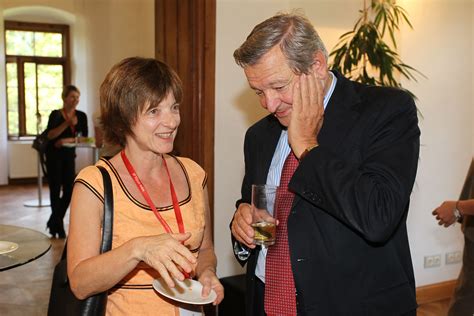A Quote by Adrienne Mayor
I think that the Greeks were extremely ambivalent about the stories of Amazons: they found them both thrilling and rather daunting at the same time.
Related Quotes
The Greeks used to use the same stories, the same mythology, time after time, different authors. There was no premium placed upon an original story, and indeed, Shakespeare likewise. A lot of people wrote plays about great kings. They didn't expect a brand-new story. It was what that new author made of the old story. It is probably the same now. We disguise it by inventing what seem to be new stories, but they're basically the same story anyway.
Great stories happen all around you every day. At the time they’re happening, you don’t think of them as stories. You probably don’t think about them at all. You experience them. You enjoy them. You learn from them. You’re inspired by them. They only become stories if someone is wise enough to share them. That’s when a story is born.
The Greeks first identified the Amazons ethnographically, as a nation of men and women distinguished by something outstanding in their gender relations. Later, any ambivalence or anxiety that knowledge of this alternative gender-neutral culture evoked among Greeks was played out in their mythic narratives about martial women.
I have written screenplays. Most recently for Errol Morris, who was thinking about doing his first fiction movie, and with a young director who wanted to adopt Project X. Errol was a hoot. I loved talking with him. We were a good match, too, because we both kept joking that we'd found the only other person on earth more ambivalent than we were about the project.
The Jews had a love-hate relationship with the Greek culture. They craved its civilization but resented its dominance. Josephus says they regarded Greeks as feckless, promiscuous, modernizing lightweights, yet many Jerusalemites were already living the fashionable lifestyle using Greek and Jewish names to show they could be both. Jewish conservatives disagreed; for them, the Greeks were simply idolaters.
The strong bond of sisterhood was a famous trait in classical art and literature about Amazons. But it was modern people who interpreted that as a sexual preference for women. That started in the 20th century. The Russian poet Marina Tsvetaeva declared that Amazons were symbolic of lesbianism in antiquity.
Siblings may be ambivalent about their relationships in life, but in death the power of their bond strangles the surviving heart. Death reminds us that we are part of the same river, the same flow from the same source, rushing towards the same destiny. Were you close? Yes, but we didn't know it then.
We know their names: Hippolyta, Antiope, Thessalia. But they were long thought to be just travelers' tales or products of the Greek storytelling imagination. A lot of scholars still argue that. But archaeology has now proven without a doubt that there really were women fitting the description that the Greeks gave us of Amazons and warrior women.
Both Socrates and Jesus were outstanding teachers; both of them urged and practiced great simplicity of life; both were regarded as traitors to the religion of their community; neither of them wrote anything; both of them were executed; and both have become the subject of traditions that are difficult or impossible to harmonize.



































